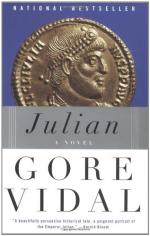
|
| Name: _________________________ | Period: ___________________ |
This test consists of 15 multiple choice questions and 5 short answer questions.
Multiple Choice Questions
1. The people of Antioch blame the famine on:
(a) Constantius.
(b) Witches.
(c) Julian.
(d) Zeus.
2. According to Priscus, the omens for the military campaign are:
(a) Unclear.
(b) Negative.
(c) Confusing.
(d) Positive.
3. With the success of his Persia campaign, Julian boasts to his generals that:
(a) He fights with his men on the front lines and does not hide in his tent.
(b) He is protected by the shield of God and does not die in battle.
(c) He kills more enemy soldiers than any of them.
(d) He conquers more land for Rome that any other emperor.
4. In the year of the famine in Antioch, the leaders of Antioch:
(a) Do nothing to prepare.
(b) Make sacrifices to the deities.
(c) Build an irrigation system to water the parched crops.
(d) Purchase grain from Egypt.
5. It is in Maiozamalcha that Julian finds the boy who becomes his servant. The boy is:
(a) A Christian.
(b) A Greek.
(c) A deaf-mute.
(d) A prophet.
6. Julian's religious fervor seems to have an impact on his troops, as evidenced by a conversation about religion between:
(a) Priscus and Victor.
(b) Oribasius and Felix.
(c) Jovian and Callistus.
(d) Maximus and Libanius.
7. Libanius seeks to secure ______ for Cimon for many years.
(a) A cure for epilepsy.
(b) Relief from seizures.
(c) Legitimacy.
(d) A Christian education.
8. Priscus says that the omens for Julian personally are:
(a) Not encouraging.
(b) Horrible.
(c) Inconclusive.
(d) Exciting.
9. Julian demonstrates his religious zeal by all of the following except:
(a) Slaughtering 100 bulls.
(b) Praying to the deities.
(c) Going to confession.
(d) Sacrificing 1000 white birds.
10. When the temple to Apollo is burned, Julian blames:
(a) Supporters of Constantius.
(b) Traitorous soldiers.
(c) The Germans.
(d) The Christians.
11. Julian tells his generals he is confident he prevails against the Persians because:
(a) He has a recurring dream about the victory.
(b) A spy tells him that many of the Persians are sick with dysentery.
(c) The Roman soldiers are better trained and more courageous.
(d) He has information from the gods.
12. After his initial confrontation with the Persians, Julian slaughters:
(a) A bull.
(b) A company of men.
(c) A flock of sheep.
(d) A ram.
13. Among the responsibilities that are weighing on Julian in Section XVII, are all of the following except:
(a) His desire to effect religious conversion among the people.
(b) His obligation to produce an heir.
(c) The duties associated with being emperor.
(d) The people's tendency to make him a scapegoat for every problem.
14. Maximus is put to death for:
(a) Being a Christian.
(b) Practicing magic.
(c) Cowardice in battle.
(d) Being a spy.
15. While Julian is in Antioch, he decrees that Christians are not to teach:
(a) Birth control.
(b) The classics.
(c) The gospels.
(d) The Old Testament.
Short Answer Questions
1. Julian's troops enter Persia and make camp at this river:
2. Julian relies on his financial adviser to advise him on how to deal with shortages caused by the famine. This adviser's name is:
3. Before engaging in battle with the Persian troops, Julian takes a day off for:
4. Julian compares the teachings of Jesus to:
5. Towards the end of Julian's campaign in Persia, although he continues to base many of his decisions on signs and omens, Julian:
|
This section contains 564 words (approx. 2 pages at 300 words per page) |

|




